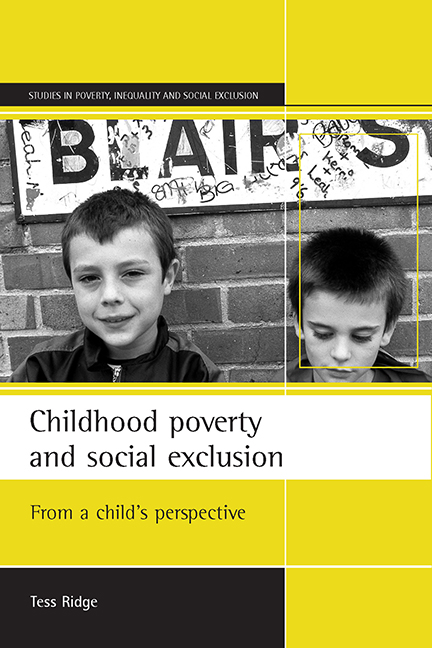Book contents
- Frontmatter
- Contents
- List of tables and figures
- Acknowledgements
- one The challenge of child poverty: developing a child-centred approach
- two What do we know about childhood poverty?
- three Children’s access to economic and material resources
- four ‘Fitting in’ and ‘joining in’: social relations and social integration
- five Family life and self-reflection
- six Experiences and perceptions of school: analysis of the BHPYS data
- seven Childhood poverty and social exclusion: incorporating children’s perspectives
- References
- Appendix BHPYS Wave 7
- Index
one - The challenge of child poverty: developing a child-centred approach
Published online by Cambridge University Press: 20 January 2022
- Frontmatter
- Contents
- List of tables and figures
- Acknowledgements
- one The challenge of child poverty: developing a child-centred approach
- two What do we know about childhood poverty?
- three Children’s access to economic and material resources
- four ‘Fitting in’ and ‘joining in’: social relations and social integration
- five Family life and self-reflection
- six Experiences and perceptions of school: analysis of the BHPYS data
- seven Childhood poverty and social exclusion: incorporating children’s perspectives
- References
- Appendix BHPYS Wave 7
- Index
Summary
This book is about the lives and experiences of children in poverty; it provides an opportunity to understand some of the issues and realities of child poverty from a child-centred perspective. With 3.9 million children (nearly a third of all children in Britain) living in poverty in 2000/01 (DWP, 2002a), the likelihood of spending part of their childhood in poverty has become a disturbing reality for many of Britain's children. It is therefore imperative that we have an informed understanding of how the experience of poverty and social exclusion affects children in their social and familial lives. We know from previous studies (Bradshaw, 1990; Kumar, 1993; Gregg et al, 1999; Bradshaw, 2001a) that growing up in poverty has severely adverse outcomes for many children. What we know far less about is how the experience of poverty and social exclusion impacts on children's own perceptions of their lives. We also have little understanding of how children interpret their experiences of poverty and how those experiences may be mediated through their differences and embedded in a diversity of social and structural environments. This book attempts to answer some of these questions by placing children at the centre of the inquiry and exploring the economic and social pressures that poverty brings to their everyday lives. This ‘child-centred’ approach underpins the process of research and analysis used throughout. At the heart of the book lie findings from a new empirical study of children and young people who are living in poverty (Ridge, 2000), which explores through their own accounts the economic, social and relational impact of childhood poverty and social exclusion. The book comes at a particularly opportune moment as policy makers and practitioners seek to address the economic and social disadvantages of childhood poverty and social exclusion, while endeavouring to move towards a more inclusive and cohesive society (DSS, 1999a).
The challenge of childhood poverty
I will set out our historic aim, that ours is the first generation to end child poverty forever, and it will take a generation. It is a 20-year mission but I believe it can be done. (Blair, 1999, p 7)
Blair's historic pledge in 1999 to end child poverty within 20 years meant that the issue of childhood poverty moved, at last, from the periphery to the centre of the policy agenda.
- Type
- Chapter
- Information
- Childhood Poverty and Social ExclusionFrom a Child's Perspective, pp. 1 - 12Publisher: Bristol University PressPrint publication year: 2002



